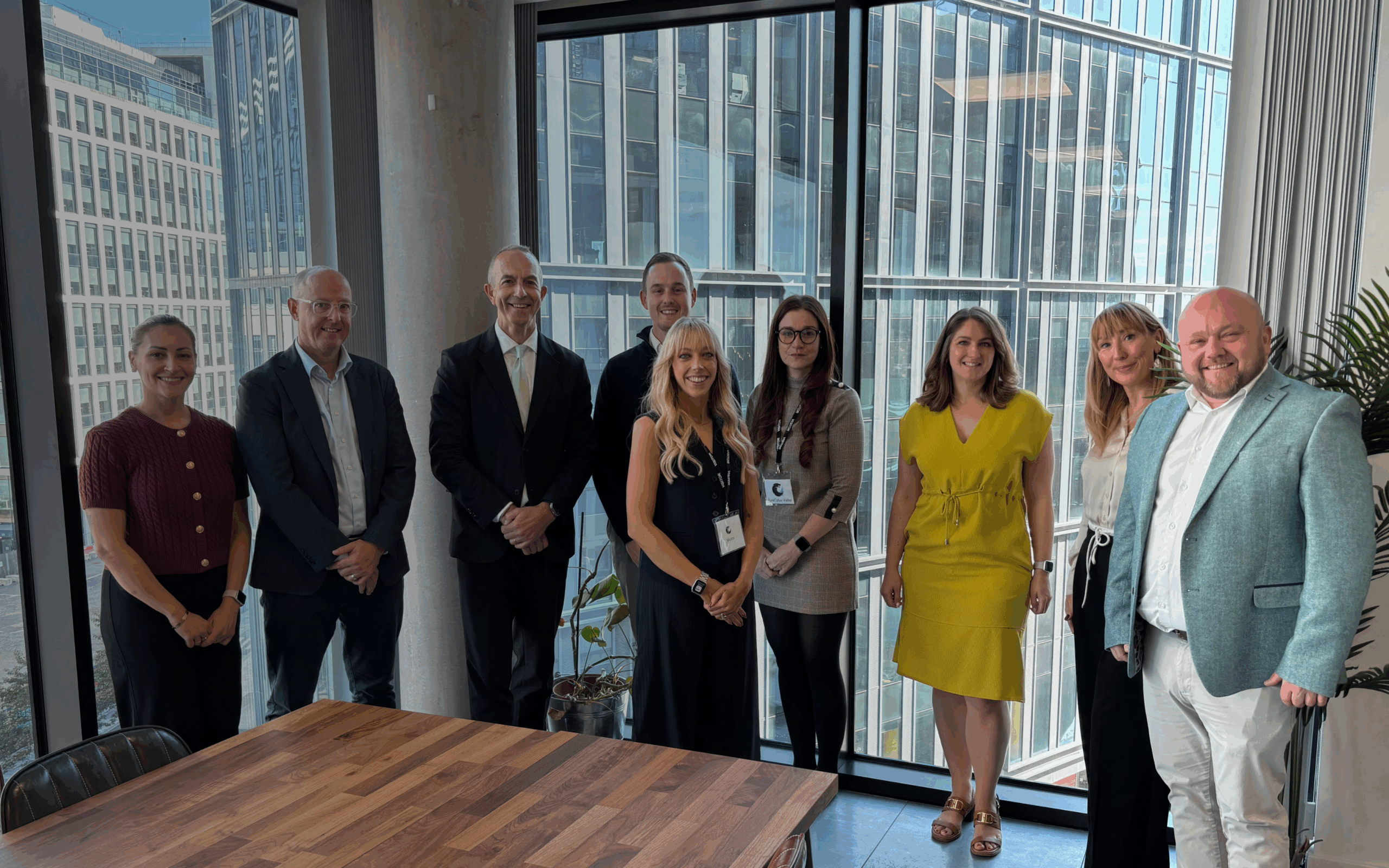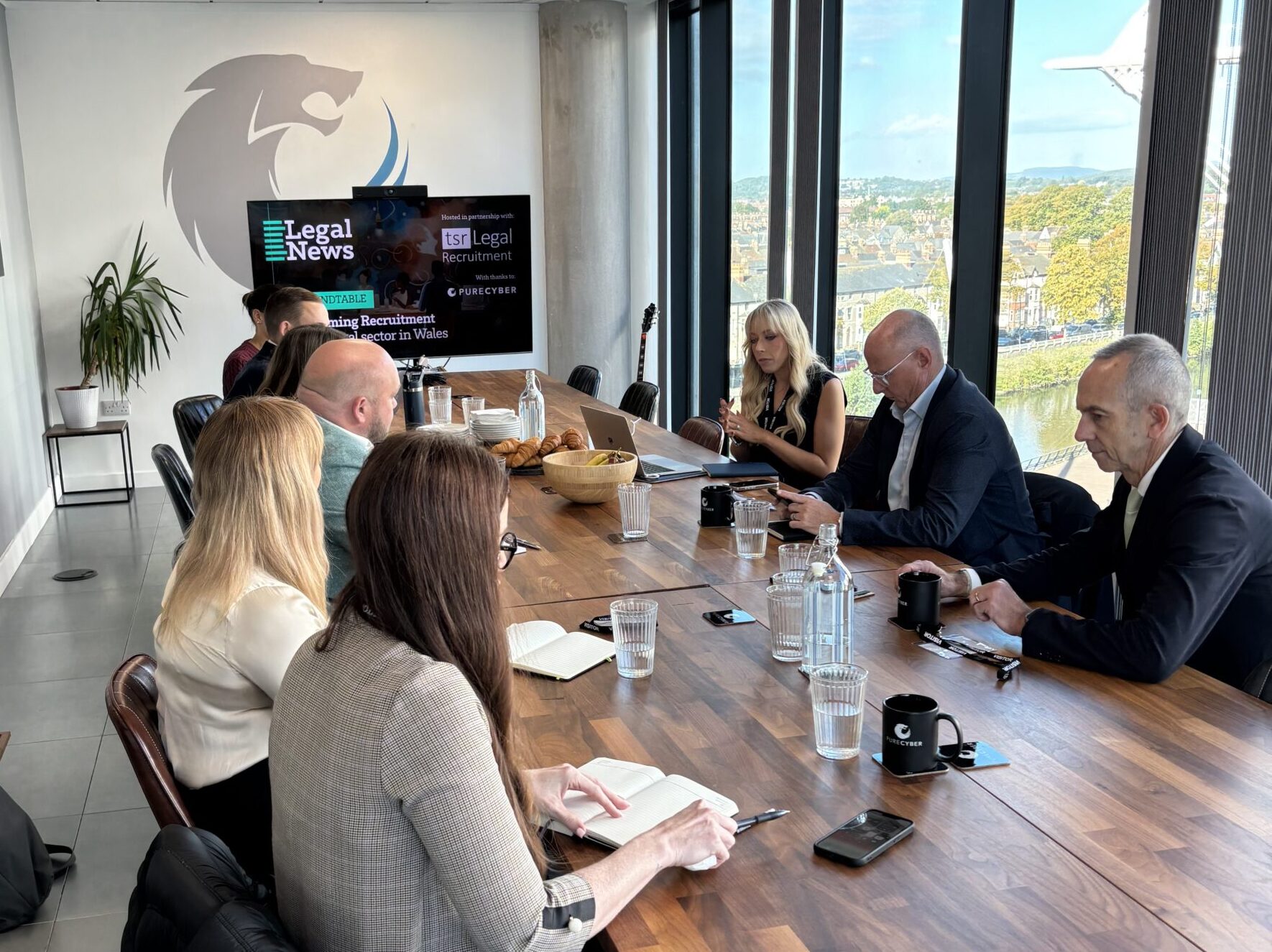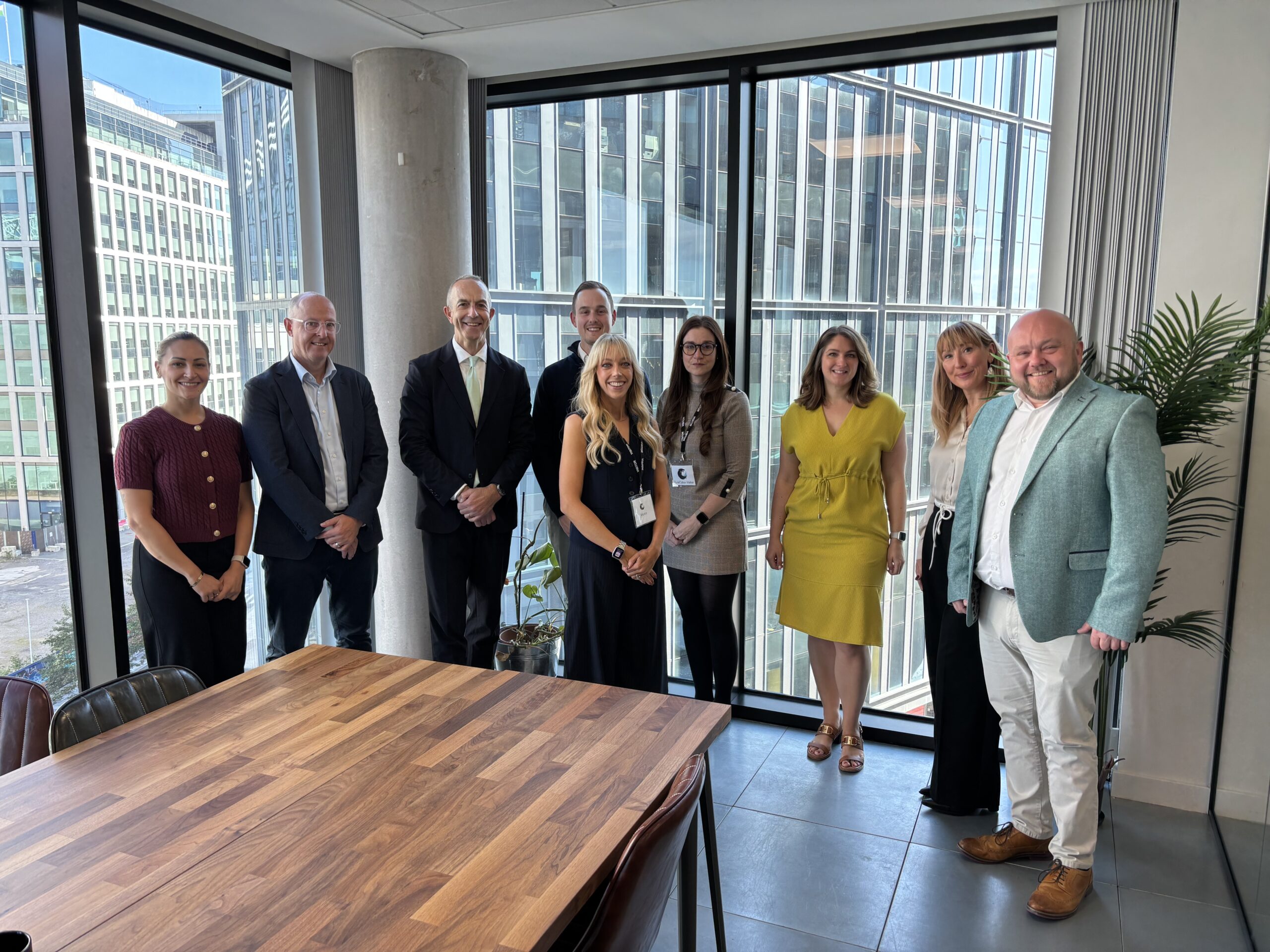Wales’ legal market is changing fast. New entrants, expanding offices and rising client demand have created opportunity across the country—from Cardiff’s city-centre practices to specialist teams serving rural communities. But beneath the momentum, a familiar set of challenges persists: how to find, attract and keep the right people in the right places, at the right time.
A recent off-the-record roundtable hosted by Legal News Wales (in association with TSR Legal Recruitment) brought together senior leaders from law firms, in-house talent teams and recruitment specialists to talk frankly about what’s working, what isn’t, and what needs to change. Here are the key takeaways.
The mid-level gap is the pressure point
Most participants can hire trainees and graduates, and several report excellent retention into qualification linked roles. At the other end of the spectrum, senior lateral hires still happen. The pinch is the middle: experienced lawyers in the 3–8 PQE range, often those with niche skills. That shortage is most acute in smaller branches and rural hubs, where headcount per office is low and local leadership is thinner.
This is especially pertinent at a time when wider economic pressures hit hard, and new legal brands are entering Wales.
For the mid-level legal professional, culture, opportunity and personal development are under increasing scrutiny by individuals in a sector that is now seeing what other professional services employers have dealt with for decades – it is no longer the case that lawyers remain in a law firm for life; moving firms is now the norm, but so is ‘tyre kicking’.
The recruiters noted that ‘tyre kicking’ – pitching current and potential new employers against each other for more money / benefits or both – is increasing but not always the case in firms that clearly communicate the benefits of their style of working, their culture, opportunities to develop and ensure transparent, equitable pathways to progress.
Geography still shapes talent flow
Success stories abound in Cardiff and Swansea—new offices, organic growth and returners are moving home – just not enough. The underbelly of the iceberg – the unknown “curious returner” market – is hard to judge but offers great potential.
While Cardiff and Swansea may have a better narrative about the returner options, market-town and rural locations in Wales have a double challenge: firstly, to compete with cities in Wales, profiling the opportunities to develop careers, exciting and profitable case-loads while balancing a strong work-life balance and / or living near family or friends, and secondly, to compete with those cities for the returners to Wales. As attendees said:
‘the work is there, the lifestyle is compelling, but the available talent pool is smaller and mid-career lawyers often gravitate to larger nearby cities.’
Money matters—so does meaning
There was lively debate about what really moves candidates. Salary differentials—particularly at NQ—can be stark and do influence decisions and inspire many counter-offers. But attendees felt strongly that culture, values alignment and visible progression routes are decisive for many, especially early-career lawyers.
Where multiple firms offer similar flexibility and wellbeing, pay becomes a clearer differentiator; where a firm’s purpose, inclusion strategy and career pathways are tangible, candidates will trade some salary for the right environment.
For regional firms, and certainly smaller more specialist firms, managing salary expectations is a real concern and ‘hard to get right’. Some have taken a view to pay the same rate across all their offices, regardless of location, while others feel they’re able to shift the dial to remain competitive in urban and city centres.
Advice around the table returned to clear communication within the firm on regional pay differences – to support cost of living or otherwise. It was clear this is a tough and common conversation for many firms, as well as the recruiters working alongside them.
The agency relationship is the lever—use it
Key to the conversations was of course about the recruitment process and how the use of external consultants and agencies is working for law firms in Wales – and especially so for legal brands coming into the nation.
Where firms do use recruiters, they report that what works is building trust on both sides, with law firms sharing a clear, honest approach to their strategy, intentions for growth and long-term objectives for the role.
Trust is needed on both sides, with recruiters calling for firms to be realistic about their offering, rather than let candidates down from day one, and for candidates and recruiters to be clear about candidates wishes and expectations.
Recruitment consultants are asked to take the time to listen to law firms, to know how the business recruits and how these processes are linked to a wider strategy and culture – for example, where law firms have a firm-wide process for team leaders and partners working from blind CVs to support key EDI and equitable development programmes). Recruiters are also asked to avoid the stereotypical ‘poor recruitment practices’ of side-stepping these carefully thought-out processes by firing CVs to partners, without invitation.
For those in the room who use recruiters, they nod to working with a select few who understand the regions and nations they operate in, forming close relationships and feeding back on what’s working and what isn’t to get the best out of the relationship.
That’s not to say out-of-the-blue approaches on potential candidates aren’t welcome, but that recruiters must understand who to contact and how they might go about that in a way that remains fair, transparent and in line with the firm’s values and processes from the start. As one attendee remarked: ‘Once you’ve seen that open CV, you can’t unsee it’ putting them in a tight spot when it comes to taking an unbiased approach to potential recruitment conversations.
While some around the table have never used recruitment agencies (and questioned themselves if, on reflection, this is the right approach), others reported the use of specialist consultants has been ‘fantastic’ – especially when it comes to whole team moves or building new teams or offices.
The roundtable consensus is that recruitment works best when agencies and law firms prioritise honest, frank discussions to avoid time-wasting on all sides and ensuring all parties meet and manage candidates’ expectations from the start. As one attendee noted:
“If recruiters can help give confidence to candidates that they can be honest about what they want from the start, we can all grow faster and more sustainably.”
The recruiters around the table, and law firms, said the relationship works best when law firms treat agencies as trusted brand ambassadors rather than transactional suppliers. On the state of the market, recruiters noted that the Welsh market is increasingly passive—good candidates are headhunted now rather than applying to adverts—so agencies need deep knowledge of teams, leaders, work types and six- to twelve-month plans to persuade people who are broadly happy to consider a move.
Clear briefs and prompt, respectful feedback between firms, agencies and candidates themselves, drive better outcomes and also help to protect employer brands.
Finally, age-old pain points persist, with poor behaviour from recruiters including ‘spray-and-pray CVs’ and bypassing HR / recruitment process (built by firms for a reason, to support wider cultural and also EDI approaches). These approaches erode trust and are a ‘waste of time’ to the extent that some in-house recruiters and teams feel they are constantly battling to manage bad recruiter behaviour that has led to blanket bans for some agencies.
Build EDI in from the start
A healthier market is an inclusive market and professional services in Wales are often praised for being the frontrunners to progress in diversity and inclusion – with a particular focus on social mobility.
Practical steps were discussed to help other law firms become more inclusive in the recruitment process, including blind CV screening for protected characteristics; balanced shortlists; structured interviews; and recruitment agency / law firm agreements to challenge bias on both sides.
Crucially, EDI must be built in, not bolted on—reflected in how roles are described, where they’re promoted, and which access routes (e.g., apprenticeships, returners, career-change) are genuinely supported.
Speed, clarity and honesty win
With candidates in short supply, speed matters when it comes to making an offer. Firms that align internally— with regular sign-offs, tight interview processes and empowered decision-makers—move faster and lose fewer candidates to delays and counter-offers.
Collectively, attendees said that radical transparency helps everyone: be upfront about salary bands, flexibility, progression, location expectations and timelines. ‘Don’t oversell; don’t ghost; don’t dither’.
Wales needs a louder, joined-up story
Perhaps the strongest theme was the narrative about opportunities in the legal profession in Wales.
Wales offers top-tier legal work across sectors—tech, infrastructure and energy, financial services, media and more—alongside a quality of life that many professionals want but rarely see marketed credibly.
Participants called for a coordinated ‘Choose Wales’ talent story, for recruiters, firms and representative voices to:
- Narrate case studies of the quality, complexity and attractiveness of work and client types gained on offer in law firms in Wales.
- Explicitly share career pathways outside the M4 corridor.
- To share the stories of ‘returners’ and professionals who have moved to Wales and flourished.
- Combined with the lifestyle messaging that helps candidates picture themselves thriving in all the regions of Wales, not just in the cities.
While competition is a challenge, we need to explain why top 50 firms are moving into Wales – it’s not to ‘west shore’ legal work, but to take advantage of the quality of work, lifestyle for employees and thriving commercial, consumer and public sector landscape our nation has to offer.
Competition also sparks transformation and accountability – raising the bar again for indigenous or long-established firms. Others added that it’s also trite to complain about new firms ‘poaching’ from incumbents as ‘we all do it’.
There was common agreement in the room that often, lawyers who leave a firm may actually offer referrals back to their old employers, and, in the long run, may even return (with their new skills and contacts).
All attendees agreed that law firms and lawyers should take a pragmatic approach to a fluid recruitment market.
Selling Wales also means rekindling relationships with universities and schools, showing students and early-career professionals that great legal careers exist across Wales—not just over the bridge – and how they can access them.
What good recruitment looks like: a simple playbook
- Partnership over procurement: Fewer agencies, deeper relationships, clearer briefs. Treat them as part of your brand.
- Process discipline: Blind CVs, balanced shortlists, structured interviews, and fast, respectful decisions.
- Talent pipelines, not vacancies: Map six- to twelve-month needs; engage universities; build returner routes; grow leaders in smaller branches.
- Tell the real story: Share case studies, team journeys and progression examples; use leaders’ and lawyers’ voices on LinkedIn and at sector events.
- Build EDI into the process: From job design to shortlisting to onboarding; measure and iterate together.
- Be radically transparent: On expectations, pay, flexibility and progression—no surprises.
Ryan Pryce, Associate Director, TSR Legal reflected on the discussion, and said:
“It was great to take some time to reflect on the recent recruitment event last week in Cardiff. I found the discussions to extremely open and honest, which was refreshing to see and really highlighted the value of creating a space where people can speak frankly about their experiences within the sector.
“It was also lovely to hear so many positive comments about TSR Legal and the work we do, feedback like that reinforces our commitment to continuous improvement.”
A healthier Welsh recruitment market is possible
The message from the room was clear: Wales can compete—and win—for talent on work quality, community, and lifestyle. To do it, law firms and recruiters need to act less like counterparties and more like partners, aligning on honesty, inclusion and long-term outcomes.
As Ryan notes:
“As an industry, recruiters all recognise that there’s always more we can do to raise standards and support one another, and discussions like this play a key role in driving that progress.”
Our Contributors
Legal News Wales would like to thank the following individuals for joining our roundtable, and for their engaging and constructive contributions:
- Arwyn Reed, Managing Partner, Agri Advisor (profile)
- Sarah Carter-Barford, Talent Acquisition Manager, HCB Solicitors (profile)
- Sian Fox-Loakes, Chief People & Culture Officer, Redkite Solicitors (profile)
- Tim Bates, Recruitment Director, Knights PLC (profile)
- Tim Edds, Head of Wales office & Partner, Browne Jacobson (profile)
- Ryan Pryce, Associate Director, TSR Legal Recruitment (profile)
- Kate Shorney-Morris, Managing Director, Zest Recruitment
- Hannah Riberyo, Chief People Officer at PureCyber Ltd (profile)(profile)
Our many thanks to TSR Legal Recruitment for partnering with us on this roundtable, and a special thanks to Cyber Security specialists and Legal News Community Partner, PureCyber for hosting our roundtable in September 2025.
For more information on PureCyber, and it’s award-winning Cyber Security Solutions for law firms, click here.
Legal sector roles & TSR Meets interviews
Click here to view the current legal sector vacancies from TSR Legal.
To read our TSR Meets interview series, click here.






